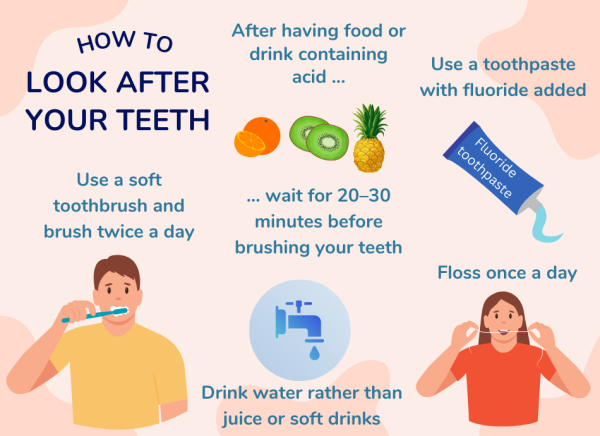You can now add Healthify as a preferred source on Google. Click here to see us when you search Google.
Toothache
Also called tooth pain or dental pain
Key points about toothache
- Toothache is a common condition that can be very painful. It can affect your biting, chewing, sleeping and overall wellbeing.
- There are different types and causes of toothache. Every person's experience is different, which can make it hard to know what's causing the pain.
- See your dentist if: your toothache lasts more than 2 days; if it doesn't go away when you take pain medication; if you have signs of fever or infection; or if the pain is increasing.
- Your healthcare provider won't be able to give you dental treatment but may be able to help with pain relief if you can’t get to a dentist.
- You may be eligible for publicly funded dental care if you qualify as low income.

The symptoms of toothache are often confusing. It can be difficult to decide which tooth is causing the pain or even whether it's coming from an upper or lower tooth. Sometimes the pain can feel like it's coming from a distant site, such as your ear, jaw bone or sinuses.
Common symptoms of toothache are pain in and around the tooth or sensitive teeth. Read more about describing your pain.
Toothache symptoms and possible problems
The following is a list of common toothache symptoms and possible problems.
Sensitivity: Sensitivity is a sharp, intense shooting pain that goes deep into your tooth. It is commonly triggered by hot, cold, sweet or acidic food or drinks. The pain can last a few minutes or even hours, while for some people it passes in a few seconds. The longer pain lasts the more likely a serious problem exists, so any pain that last more than a few seconds should be checked by your dentist as soon as possible. Read more about sensitive teeth.
Sharp pain when biting down on food: This pain is commonly caused by tooth decay, a loose filling or a crack in your tooth as the tooth could be flexing when pressure is put on it. It’s also possible there is damage to the inside of your tooth. This should be checked by your dentist as soon as possible.
Pain together with gum swelling and sensitivity to touch: This may be caused by an abscess, which is a pocket of pus that forms around the root of an infected tooth. Get help as soon as possible, as abscesses don't go away on their own.
Dull ache and pressure in the upper teeth and jaw: This may be caused by a chronic infection (eg, a developing abscess) or by grinding your teeth (known as bruxism). Most people who grind their teeth and clench their jaw are not aware they're doing it. It often happens during sleep, while concentrating or when under stress. Talk to your dentist if you have these symptoms.
Most aching types of toothache are from the very thin soft lining around the root of your tooth (under the gum) becoming inflamed or irritated, either by clenching and grinding or by an infection allowing bacteria into this area. The lining is trapped between the hard tooth and the hard bone where there's no space for any swelling, so pressure builds up which causes the aching.
Most types of sharp temperature or chewing toothache come from the part of your tooth above the gum and is to do with the tooth not being well enough protected from things we eat and drink. Often clearing the decay, replacing an old filling, or covering the unprotected surface with filling will be able to fix this sort of pain.
Note: This is not a complete list.
While you're waiting for an appointment with your dentist you can take pain medicines such as paracetamol or ibuprofen. Your pharmacist can advise you on suitable pain relief for you.
Clove oil or chewing a whole clove is a natural remedy that can occasionally be effective for temporary relief of some toothaches. You can also try rinsing your mouth with saltwater. Some people find putting an ice pack on their cheek offers some relief. For sensitivity pain, some desensitising toothpastes can be effective.
Lying down can increase toothache, whereas sitting, standing or having your head raised can help by reducing pressure on the area. If your toothache is affecting your sleep, try propping your head up with an extra pillow or two. It often seems worse at night because there's nothing to distract you.
Also, try to avoid pain triggers, such as hot or cold foods.
Aching pain can get worse and worse if bacteria are causing an infection, which can make you ill throughout your whole body. Sometimes antibiotics help to lessen the bacteria in the infection until you can get to a dentist to fix the problem. Antibiotics don't solve the problem, but they can reduce the pain for a short time.
The best way to prevent toothache is to keep your teeth and gums as healthy as possible.
- Have regular dental check-ups.
- Have sugary foods and drinks only as an occasional treat at mealtimes.
- Brush your teeth twice a day for about 2 minutes with a fluoride toothpaste.
- Clean between your teeth using floss or an interdental brush every day to remove food, debris and plaque.

Image credit: Healthify He Puna Waiora
Children in Aotearoa New Zealand who meet the eligibility criteria(external link) for publicly funded health and disability services can access free basic oral health services from birth until their 18th birthday.
A limited range of dental services are funded for some adults.
- People with disabilities or medical conditions such as mouth cancer may be referred to a hospital for their dental treatment by their usual dental practitioner or GP.
- People on low incomes who have a Community Services Card may be able to get emergency dental care, such as pain relief or extractions.
If you have a low income or benefit, you may be able to access a Work and Income grant(external link) towards the cost of dental treatment. You may have to pay some of the money back depending on your situation.
Find a dentist in your area Healthpoint, NZ
Find a registered oral health practitioner(external link) Dental Council, NZ
Emergency dental care in NZ(external link) Health New Zealand | Te Whatu Ora
Publicly funded dental care(external link) Health New Zealand | Te Whatu Ora
References
- Toothache(external link) NHS, UK, 2024
- Tooth pain(external link) American Association of Endodontists, US
Dental health(external link) Ministry of Health, NZ, 2019
Some dental and periodontal diseases(external link) PatientInfo, UK, 2014
Credits: Healthify editorial team. Healthify is brought to you by Health Navigator Charitable Trust.
Reviewed by: Dr Sophie McKenna, General Dental Surgeon
Last reviewed:





